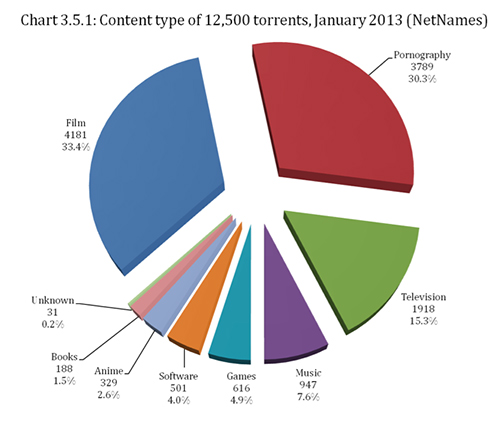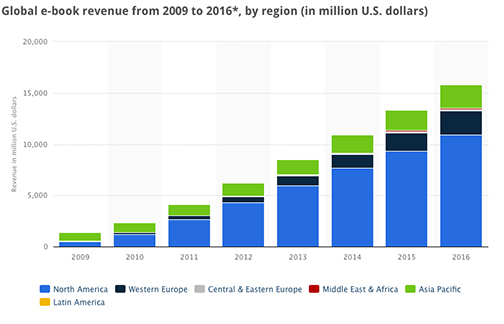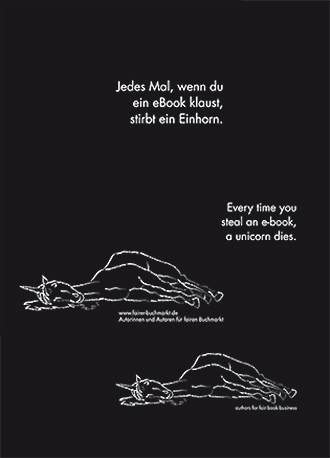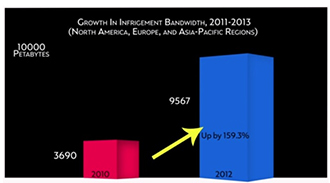eBookpiracy:
Since the beginning of the Web in the 80ties, digital piracy increased. Any digital content can be stolen: Songs, movies, photos, software, (video) games – and books.
Sources: David Price/ Director of Piracy Analysis, NetNames September 2013 // Europäisches Parlament – chair of culture // GVU Germany // BOEV Germany // Féderation of Europeen Publishers // Gutenberg-Report Bonik/Schaale // Havocsope – black market and intelligence informations // digital music news // Daily Mail // World News // Telegraph // APPLE // www.fairer-buchmarkt.de // PEN-Center Germany
In the 90ties, when the web was slow and a download of the new U2-Album cost about four hours, piracy happened to illegal software and games, in the form of cyber crime (illegal tradings with creditcards or hacking computersystems of banks), or ocurred as stealing music with Napster and mp3, and porn clips. If you wanted to copy „Pretty Woman“, it cost you two and a half days to download. Not funny for professionel content-thiefs in the early times of Digi-Age. A hundred books were scanned and circulated (and still do) as pdfs in the botnets. About 70 Million people all over the world had access to infringed content about once a month, or even less. Piracy happened at sea, not in the web.
Welcome to Pirate Bay today: The actual internet 3.0 is faster, powerful and everywhere. Since 2008, when iPad and Kindles were launched, new gadgetry is flooding the world every season. Tablet-Pcs, Smartphones, Pc, E-Readers; every year, there are 410 million pieces of hardware sold worldwide. Thanks to WlFI, today it just takes 12 seconds to load the U2-Album, and three seconds to copy a whole novel. For free. Today, there are 600 active platforms, dealing with 1,2 billion illegal copies of media: songs, books, movies, videogames. In January 2013, 327 million people worldwide used infringing content frequently. This number comprises 26 % of all web-users. So, 1 of 4 users is stealing books, films, and music. And the rates of eBookpiracy? They are increasing every year by 130 to 160 %.
With modern equipment, it is so easy to get your daily dose of free illegal entertainment.
You do not have to go in one of these dark places in the Web, called Warez-Sites or BitTorrent-Groups, where they also deal with drugs, women or porn. No, you can do it at Starbucks or in your bathtube! Google and other search engines help you doing that within a split second. Any user can find out the best links and URLs to the next distributation page of illegal copies. Among the ten popular combinations that include the word “ebook”, four were combinations with “rapidshare,” “free,” “torrent,” “no cost.” (Gutenberg 3.0, Bonik). Pirating ebooks is a breeze. Their file size is so small that it usually takes all of 60 seconds between a Google search and having the book on your Kindle. That's why Google gets 1 million deletion requests for illegal URL. Every Day. Google only deletes every third link to illegal torrent-files. 30 % of all web-traffic is about illegal downloads, streaming or sharing. Most of them is porn movies and films, follwed by videogames, and, at BitTorrent networks, ebook traffic is 1,5 %.
The black market of digital media has overwhelmed the prime market. For every sold song, 40 are stolen. For every sold software game, up to a 100 are stolen. Every second eBook on an e-reader in Europe is illegal.
For every sold eBook, 10 to 20 illegal e-copies are taken for free.
Despite of this, some people still call e-book piracy „collateral damage“. Yeah, thank you. This is the world's book market: 151 billion dollars of sales per year. Bigger than movies and video games, but smaller than music business . In Europe 1,3 million people work in the book market.
Some piracy fans and politicians still tell us, to not care about it. Or tell us that piracy-reading even is a sort of a marketing strategy; yes, why not see it like that? And on top of that, not every stolen book is even read, so we do not loose anything, right? So, there is not even proof that this stolen ebook would even have been bought in real life!
They say: Not every stolen book is a missed purchase! And there is a human right on books and reading and culture, isn’t it?
Yeah. Free the words!
But there is no right to get these words for free.
THE ILLEGAL eBOOKs worldwide in the circle of up/download:
80 platforms worldwide are dealing with 2,2 Millions books, fiction and non-fiction. 21 % (Germany) to 92 % of those readers (Russia, China) never buy, they retrieve content free on illegal platforms,, via streaming, blogs or e-mail. Even if not every single stolen ebook is a lost purchase, even if we calculate very conservatively that only every 20th stolen eBooks is a lost purchase, then we raise it up to… oh, one moment, I have to get a drink.
Today, 4 billion dollars are spent on e-books worldwide, that means about 400 Million sold eBooks. This number is going to increase to about 20 billion dollar and 2 billion e-books in the next two years. Piracy will increase, too.
If even only every 10th or 20th stolen e-book is ONE lost purchase, until 2017, we will have lost round about the same income: 20 billion dollars.
WHO ARE THE people who steal books? Beside boerse.bz, rapidshare, mega upload, ebookspender, lul.to, scribid.com:
Based in Russia, this is the largest illegal eBook-Platform worldwide with 30 Terrybytes of content. This means:
• 1 million files of mainly non-fiction ebooks (education, knowledge)
• 900.000 of fiction ebooks (novels)
• 20 million papers from journals of science, history, art, comics, etc.
• It is called „Library of Congress of the digital world“.
• The Libgen movement mainly focusses on downloading whole collections that have already been posted in fora or as torrents, it „collects“ all the illegal files
• It has channels to over 50 servers of universities worldwide, and everytime any (cours, lecture, science, masterpiece) e-book is uploaded to a kind of intranet-server, LibGen makes a digital copy on one of their 14 servers („= mirrors“) in Panama, Suisse, Russia or Netherlands automatically.
• The leading seeder (uploader of content) of LibGen is a German librarian
• In August 2014, AMAZON was hacked by LibGen, with a special Google-Chrome-Virus. They transform Amazon into a pirate site, showing the link to illegal sources when somebody searches a book at Amazons. Well, Jeff Bezos was not so happy about this new „feature“.
How to steal an eBook in 2014.
• file sharing networks: search for title, get a link to the file, download
• ftp servers: find millions of URLs to file-packages of the latest bestsellers
• newsgroup services: use a subscription to get the latest book-news
• peer-to-peer networks: share online or by mail what your friends read
• sharehosters: pay some cents or not for e-books
• DDL-blogs: get a link to the adress of a file (depositfile or rapidshare)
• USB-stick: put 500 or 1000 books on the stick and send it per snailmail
• Mail it. Just attach any mobi or pdf or epub. Nobody can control attachments. Read it on your smartphone. Most of e-book-piracy works like that: MAIL!
• Top Sites: be a member of secret circles who share illegal content
• Usenet: participate in anonymous forums and get your stuff send from friendly users
• Streaming: do not download it, just read it on the web. The justice has no idea how to deal with that streaming-thing, because it does make no real copy!
• YOU CAN STORE EVERY STOLEN NOVEL WORLDWIDE ON ONE HARD DISK of 1 terrabyte, big as a book. Nothing is more easy to steal than ebooks.
Visitors on Torrent-Sites worldwide last year (2013)
The black market of books: The inner rules
1 the bigger the ebook-market, the higher is ebook-piracy: more data to hack!
2 the lower or non-existant the ebook-market, the more scans you have online
3 esp. Latin-America (Peru, Chile), Pakistan, India and Arabian Countries printed piracy of textbooks (copies on paper) is the leading „market“
4 the mentalityof a culture decides about ePiracy: Russian, Chinese and Germans have this „Geiz ist Geil“ / parsimony is hot-Attitude and no much emphasis for art and artists. In France they love books and want to spend as much money for them as for food and vine ;), in Spain the crisis put the readers to piracing ebooks. In countries where education is expensive or a government is too opressing, piracy of textbooks is like self-defense
5 every english e-book will be stolen – just because it is written in English.
6 the average of downloads per stolen file is 300-times, bestsellers up to 100.000 times.
7 every second ebook on every Kindle-reader worldwide is stolen.
8 „Hard“ DRM or watermarks are a challenge for hackers. They steal books not to read them, but to hack the digital rights management!
9 flatrates do not reduce or even fight piracy, because nothing is so cheap as free
eBook and printbook piracy and their share of the total amount of books (e/p). The darker it gets, the bigger the black market is.The biggest pirates are…
Gold for Europe, silver of Asia Pacific, only third prize for US.
WHAT OTHERS WIN BY PIRACY: FOLLOW THE dirty MONEY
ADVERTISEMENT!
The vast majority of BitTorrent sites and streaming platforms make money through ADVERTISING. Banner adverts, pop-up adverts: The ads pay the admin, the technique, webspace. Pirate Bay had about 1 Mill. Dollar annullay with banner adverts. On the main platforms today, advertisement make an anually 6 million dollar for the platform holder. Millions. No cent fo writers.
PAID PIRACY
Some of the illegal hosters sell illegal copies, and some file hosters want to sell you a sort of „premium account“. With a premium account you can download as much as you want, fast and safe. With no premium account you can just steal one file per day. The money goes half to the filehoster, half to the uploader, who is „spending“ cracked ebooks. As „uploader“, the premium account costs 60 Euro/Year. It has 3 Million members. This is 180 Million Euros. No cent for writers.
SCAREWARE!
When you download some of the billions of free file, some of the sharehosters will give you a nice little gift – Scareware! They block the computer, you have to pay the developer of the scareware virus about 50 to 150 Euros.
PAYING SYSTEMS!
Paysafe, PayPal, Mastercard and others: they help you to pay your premium accounts or paid piracy and make it anonymous and easy. They get provisions of 10-20 % of each payment. Nad… right. No cent for the writer.
VPN-SERVER
If you want to be absolutely anonymous, you have to hide your IP address. So some platforms send you on to „service companies“ like „Hide.me“, which helps you to crypt your address. Yes, you have to pay again – and again no cent for the writers.
REWARDS FOR UPLOADER
Earn money with stolen ebooks. Some sites offer rewards for every uploaded book. You will get 4 dollars for 1000 clicks to megaupload, for ex.
CONTENT FOR FREE – WORKS FOR ME
Every artist feeds a machine with his work, so called „content“. Apple will never help any artist against piracy, because people love the ipad and buy that for a lot of money; but they do not want to buy any content.
After Christimas or the release of a new pad, phone, reader or tablet, the numbers of illegal downloads increase for several weeks.
Google profits from the large content they can present for free, themselves not being responsible for any piracy sites.
Any provider is happy because somebody is paying for renting webspace; the provider will not ask what kind of traffic the money brings.
NO TAXES TO BE PAID for sold ebooks
NO INVESTMENT TO BE DONE, just the cost for server and graphics
NO FEAR TO GET JAILED – the international laws make it nearly impossible to arrest any of the big players in piracy business because nobody is responsible for anything
COOLNESS for any POLITICIAN
Nothing like a sexy politician who is innovative, modern and belongs to the „digital avantgarde“. To down-talk piracy, to support big players like Facebook or Google, is the way most politicians in Europe deal with this subject.
WHAT WE LOSE
MONEY
Digital piracy first harms the original copyright and rights holders: the writers. We lose money to those who sell pirated copies cheaply or free.
Yes, it’s impossible to calculate exactly how much revenue publishers and authors are losing to internet pirates, cause we do not know how many files are stolen and how many people would have bought our work.
According to information provided to the Association of American Publishers, U.S. publishers across all categories lose $80 million to $100 million annually to piracy. And that estimate is very likely way too conservative.
“Even at a low estimate of 100 downloads per file—apparently the average file is downloaded 300 times—that is potentially almost 60 million downloads,” says Chris Anderson, Muso’s (a file defender) client manager for publishing.
CONFIDENCE
The theft of our work also discourages us from doing further creative work, defeating the fundamental purpose of the Constitution's copyright provision.
We have to fight against piracy as long as there are no international rules and laws for the virtual world. The Web does not have any limits or borders, but our laws and rights are ending at the borders and limits of countries.
We lost our faith in law, our trust in governement, our confidence in humanity. Are you willing to write for people who rob you?
JOBS
Every year, the creative economy of the European Union, which suffered most from piracy (film, tv-series, music recordings and software) loses 10 billion Euro (10 Milliarden Euro). From the 14 million people working in creative jobs in all 27 EU-Countries, 185 000 jobs have been destroyed due to digital piracy and the loss of income and money (*TERA)
RESPECT
We are having a perception problem. People who grew up with the internet don’t always understand the connection between art and work. What started out as an opportunity for free access for everyone has turned into an opportunity for artists to have their work abused by strangers for profit.
VOICE
No money: no voice.
Politicians listen to companies with money, not to peole without money.
For what should we work: food? Who is gonna pay our rent: A sponsor, who is also deciding about our work and subjects? Who will ever listen to people whose work and performance is not accepted in the web, or in law, or by the government? What kinds of books do we have to write – mainstream bestsellers? - to earn some lousy pennies from flatrates and low-priced-books?
This Report was presented by Nina George at:
Freedom of expression and censorship in Rhodes/Greece. Seminar 2. - 5. 10. 2014
4.10. 2014 / 15:00 - 16:00 | Dr. Faiha Abdulhadi, Nina George, Helge Sønneland
The importance of copyright














